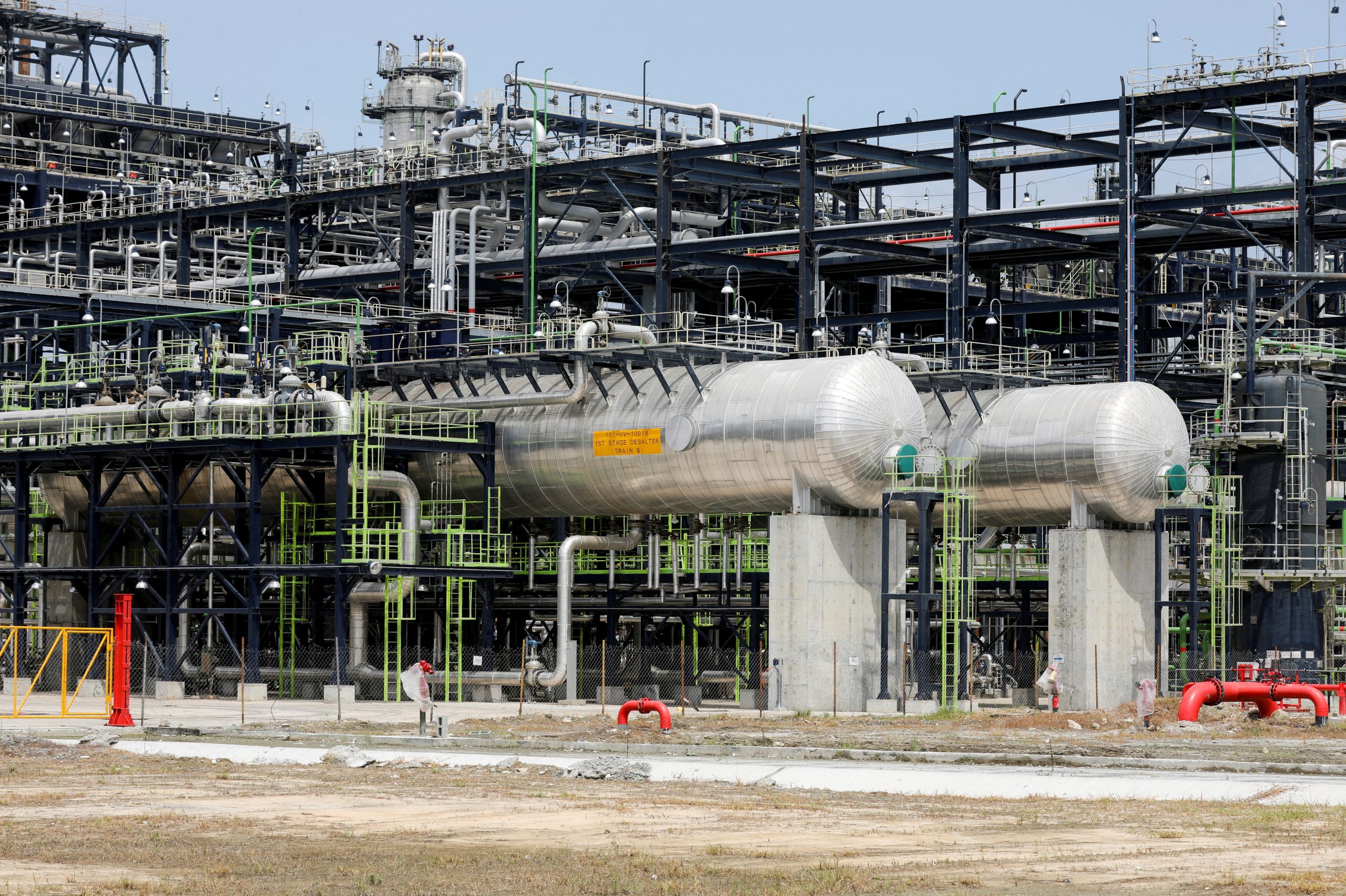The Dangote Refinery has resumed purchasing crude oil from the United States to increase its refining capacity and boost production levels. This marks a notable shift following a three-month pause in foreign crude oil purchases, during which the refinery primarily relied on domestic supply.
According to a Bloomberg report on Wednesday, the refinery has acquired a shipment of approximately two million barrels of WTI Midland crude from Chevron Corporation. The cargo is expected to arrive at the refinery in early December, loaded onto the supertanker Azure Nova from the US Gulf.
This purchase suggests possible challenges in securing a sufficient crude supply locally. It also raises questions about the progress of the naira-for-crude arrangement between the Nigerian government and Dangote Refinery, an agreement that had been proposed as a means of facilitating domestic crude transactions.
The Shift to US Crude
The resumption of US crude imports highlights an evolving strategy at the Dangote Refinery, as it continues to ramp up production capabilities. The choice of WTI Midland crude, a premium grade of oil from the United States, aligns with the refinery’s goal of refining high-quality products that meet global standards.
Bloomberg’s report revealed that Chevron Corporation booked the supertanker Azure Nova to transport the crude, with loading scheduled around December 5. This shipment underscores the refinery’s global sourcing strategy, despite being situated in one of the world’s largest oil-producing nations.
Domestic Supply Constraints
The purchase of foreign crude comes amidst signs that the Dangote Refinery may not be receiving adequate supply from the Nigerian National Petroleum Company Limited (NNPC). While the refinery initially prioritized domestic crude, it appears that sourcing from foreign markets has become necessary to sustain operations.
The move also casts doubt on the viability of the naira-for-crude arrangement proposed by the federal government in October 2024. This deal was intended to allow the refinery to purchase crude oil using naira instead of foreign currency. However, it seems the agreement has either faced delays or proved insufficient to meet the refinery’s supply requirements.
Kelvin Emmanuel, an economist, recently noted that the refinery continues to purchase crude from the Nigerian government in dollars, despite the proposed local currency arrangement. This highlights ongoing challenges in aligning domestic policies with the operational needs of the facility.
Implications for Nigeria’s Oil Sector
The Dangote Refinery, expected to be a game-changer in Nigeria’s oil and gas industry, is positioned to reduce the country’s reliance on imported refined petroleum products. However, its reliance on foreign crude oil highlights the complexities of integrating domestic resources into its operations.
This development also raises broader concerns about Nigeria’s crude oil production and distribution systems. While the country boasts significant reserves, logistical, regulatory, and infrastructural hurdles often impede efficient supply to domestic refineries.
The resumption of US crude purchases by Dangote Refinery underscores the urgency of addressing these challenges. Ensuring consistent local supply will not only bolster the refinery’s capacity but also reinforce Nigeria’s push toward energy self-sufficiency.
Looking Ahead
As the Dangote Refinery ramps up production, its sourcing strategies will likely continue to evolve. The facility’s ability to secure adequate crude supplies—whether locally or internationally—will play a pivotal role in achieving its ambitious goals.
The coming months may also provide clarity on the status of the naira-for-crude arrangement and whether the government can implement policies to ensure steady domestic supply. For now, the refinery’s reliance on foreign crude underscores the need for sustained efforts to address inefficiencies in Nigeria’s oil sector.
This strategic pivot, while necessary for the refinery’s immediate needs, serves as a reminder of the pressing need for long-term solutions to bolster local crude supply and maximize the potential of Nigeria’s oil industry.












I think Nigeria should focus on developing its own oil resources instead of relying on US crude. Lets prioritize domestic supply! 🇳🇬 #NigerianOilIndependence
I think Dangote should focus on supporting local oil producers instead of buying US crude. Nigeria first! 🇳🇬 #SupportLocal #OilSectorDebate
Supporting local producers is important, but diversifying sources can also benefit Nigerias economy. 🌍 #GlobalPartnerships
I dont see the big deal with Dangote buying US crude. Maybe its time to diversify our sources and not rely solely on domestic supply.
I think its time Nigeria focused more on developing its own oil resources instead of relying on US imports. #SupportLocal #ControversialOpinion
I dont get the big deal about US crude oil. Why not focus on developing our own resources instead? #SupportLocal #NigeriaFirst
I think Dangote should focus on supporting local Nigerian oil producers instead of relying on US crude. Lets prioritize our own resources first!
I think Nigeria should focus on developing its domestic oil production instead of relying on US crude imports. Lets prioritize our own resources!
I think Nigeria should focus on developing domestic oil production instead of relying on US crude. Lets prioritize our own resources!
I think its time for Nigeria to focus on developing its own oil resources instead of relying on US imports. #SupportLocalEconomy
I dont get why theyre resuming US crude purchases when we have our own oil. Seems fishy to me. 🤔
I dont get why theyre buying US crude when we have plenty at home. Seems like a waste of resources.
I think Nigeria should focus on developing its own oil resources instead of relying on US crude imports. Lets prioritize local industry growth!
Why is Dangote refinery resorting to US crude? Are we neglecting our domestic resources? Lets prioritize Nigerias oil sector first.
I dont understand why Nigerias Dangote Refinery is buying US crude. Shouldnt they prioritize local resources first? #SupportLocalEconomy
Global market dynamics drive purchasing decisions. Diversification benefits Dangote Refinery and Nigerian economy. #EconomicRealities
I think Nigeria should focus on developing its own oil resources instead of relying on US crude. #SupportLocalIndustry 🇳🇬
I think Nigeria should focus on developing its own oil resources instead of depending on US crude. Lets prioritize our own wealth!
Why limit opportunities? Diversifying oil sources could strengthen Nigerias economy and global position.
I think Nigeria should focus on developing its own oil industry instead of relying on US imports. Lets invest in local resources!
Why limit options? Diversity in energy sources is key for stability and growth. Consider both local and global markets.
I dont get why were still relying on US crude when we have our own resources. Nigeria should prioritize domestic supply over imports.
I think Nigeria should focus on developing its own oil resources instead of relying on US crude imports. Lets prioritize domestic growth!
I think Nigeria needs to focus on developing its own oil resources instead of relying on US crude oil imports. #SupportLocal #ControversialOpinion
US oil imports help stabilize global oil prices. Diversifying sources is wise. #GlobalEconomy #StrategicThinking
I dont get why Dangote is buying US crude when we have domestic supply issues. Seems like a strange move.
I think Nigeria should focus on developing its own oil resources instead of relying on US crude. Lets prioritize our own economy first!
I think Nigeria should focus on developing its own oil resources instead of relying on US crude imports. Lets prioritize domestic growth!
Why limit options? Diversifying sources can strengthen economy and reduce dependency risks.
Im not convinced Dangotes move is a good idea. Shouldnt Nigeria focus on domestic supply first? Lets discuss!
I wonder if this move will impact local oil prices in Nigeria. Exciting times ahead for the oil sector!
Why is Dangote Refinery turning to US crude oil? Will it solve Nigerias supply challenges or create new ones? Exciting times ahead!
Why not explore other oil sources instead of relying on US crude? Diversification could be key! #OilIndustryInsights